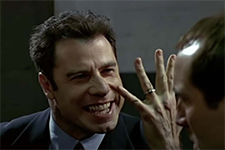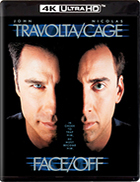Face/Off (4K UHD)
|  Face/Off was Hong Kong auteur John Woo’s third attempt to make a Hollywood film. With his first attempt, Hard Target (1993), he tried to make a signature John Woo-style extravaganza, but was neutered by uneasy studio executives and an MPAA ratings system that found his blood-spurting operatics too much. Woo responded by making Broken Arrow (1996), a by-the-numbers action-adventure that could have been made by virtually anyone. While a disappointment to Woo’s fans, its box-office success gave him enough leverage to do things his way once and for all in making Face/Off, which remains his best American film. Woo’s coup de grace was having John Travolta (who had already worked with Woo on Broken Arrow) and Nicolas Cage, two of Hollywood’s most unique, interesting, and idiosyncratically gifted actors, in the same movie together. Unlike many action directors, Woo is able to draw multi-layered performances out of his actors and actually incorporate them into his films, so that his over-the-top action is underlined with characterization and emotion, albeit in an often heightened form that is more familiar to Asian than American audiences. We actually care about the people who are surrounded by a hail of bullets, thus we are involved in the action both emotionally and viscerally. The line between the emotional and the physical is very thin in Woo’s cinematic worlds. The screenplay by Mike Werb and Michael Colleary involves Woo’s favorite theme: a cop and a crook who have more in common than they think. Like the great Sam Peckinpah, Woo is attracted to complex and broken heroes, ones who have vicious dark sides that oddly mirror the criminals they are chasing. He relishes mixing black and white, refusing to infect his movies with perfect, indestructible heroes. He understands the human dilemma inherent in all situations, and he allows his heroes to act badly, to remind us that they are people, flaws and all. According to Woo, “There are no really good guys or bad guys in this world. I think all of mankind, we all have some good things, bad things. That is realistic to me. That’s real ... especially, for my hero. Sometimes he’s good, but sometimes he’s a little bad.” Woo’s hero in Face/Off is Sean Archer, initially played by Travolta. Archer is an FBI agent who has spent the past six years obsessively pursuing an international terrorist mastermind named Castor Troy (Cage) who was responsible for the death of Archer’s four-year-old son. In a huge shoot-out at the airport, Archer captures Castor’s brother/partner, Pollux (Alessandro Nivola), and puts Castor in a coma. Unfortunately, Archer discovers that they have planted a bomb full of nerve gas somewhere in Los Angeles. The only way to find out where it is located is to get the information from Pollux, a paranoid sociopath who will never willingly divulge the information. This leaves Archer with one option: disguise himself as Castor and enter the prison where Pollux is being held to extract the information. How does he do this? By a special, high-tech surgical procedure where Archer and Castor will literally exchange faces. On paper, this sounds utterly preposterous (it was originally envisioned as a sci-fi movie), but the premise is set up so matter-of-factly that you are immediately convinced. Woo shows the surgical procedure in graphic detail, and by the time it is over, Archer is literally wearing the face of his son’s killer. Unfortunately, while Archer is in prison getting the information, Castor wakes up, forces the doctor to give him Archer’s face, then he burns down the lab and kills everyone who knows about the secret mission. So, Castor (now played by Travolta) is cruising the streets free and invading Archers’ home, while Archer (now played by Cage) is locked in prison. Archer’s wife (Joan Allen) and daughter (Dominique Swain) have no idea they are sleeping with the enemy, and the prison guards have no idea they are beating one of their own. Thus, the movie literally turns into a battle of identity, bringing up all kinds of questions and dilemmas. What would be the repercussions of switching identities with a killer? What would it be like to have to look in the mirror and see that you are wearing the face of your son’s murderer? Of course, it is also a brilliant device for allowing Travolta and Cage free reign in their performances. Each actor plays both the good guy and the bad guy, and each is memorable in his own way. They dig deep into the characters and mimic the small details, such as the way they walk or the way they smile. Although the plot sounds confusing on paper, the actors do enough to make it clear who is who at all times. Finally free to make a film his way, Woo dug into his Hong Kong roots to do what he does best: melodramatic ultraviolence. The action scenes are pure spectacle to behold—stylized and enhanced through slow motion, thunderous music, and specifically choreographed bloodletting. They are also uniquely his, especially the way in which he incorporates his affinity for movie musicals, such as the scene in which a deafening shoot-out is scored to Olivia Newton-John’s rendition of “Somewhere Over the Rainbow.” The starkly discordant music has a striking aesthetic effect, but it also plays into the film’s emotional impact in that the music is meant to reflect a child’s inner state as he is shielded, however tentatively, from the violence around him. Thus, the violence works because it is punctuated by emotion and drama. More than anything, Face/Off is a story about family, as Archer struggles to piece his broken family back together in the wake of tragedy. That he does so through violent means is both an expected part of the genre, but also a reflection of Archer’s own broken soul. At the beginning of the film, he doesn’t care if he lives or dies; by the end, he does. Thus, the violence, hyperkinetic as it is, is always grounded in character dynamics and an underlying belief in the sanctity of the family, which is what makes Castor’s invasion of it all the more perverse. Face/Off has many similarities to Woo’s best film, The Killer (1989), which was the first to gain him international notoriety and subsequent notice in Hollywood. Both films share an odd connection between the cop and the criminal, both have a scene where the two enemies find themselves face-to-face with guns inches from each other’s throats, and both have climactic shoot-outs in a church with white doves flying in the background. Both films feed insatiably on Woo’s peculiar melodramatic brand of pop art, and even if Face/Off isn’t quite the equal of The Killer, it still works brilliantly.
Copyright © 2024 James Kendrick Thoughts? E-mail James Kendrick All images copyright © Kino Lorber / Paramount Home Entertainment | |||||||||||||||||||||||||||||
Overall Rating: 


 (3.5)
(3.5)


